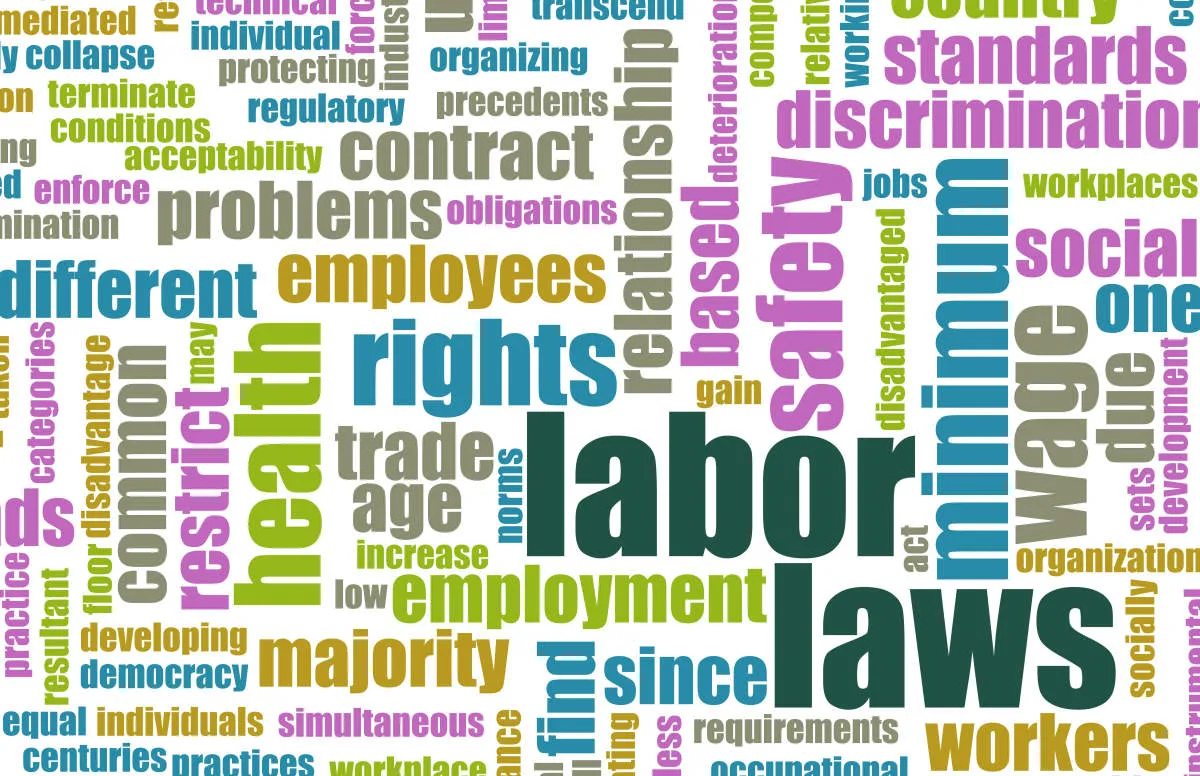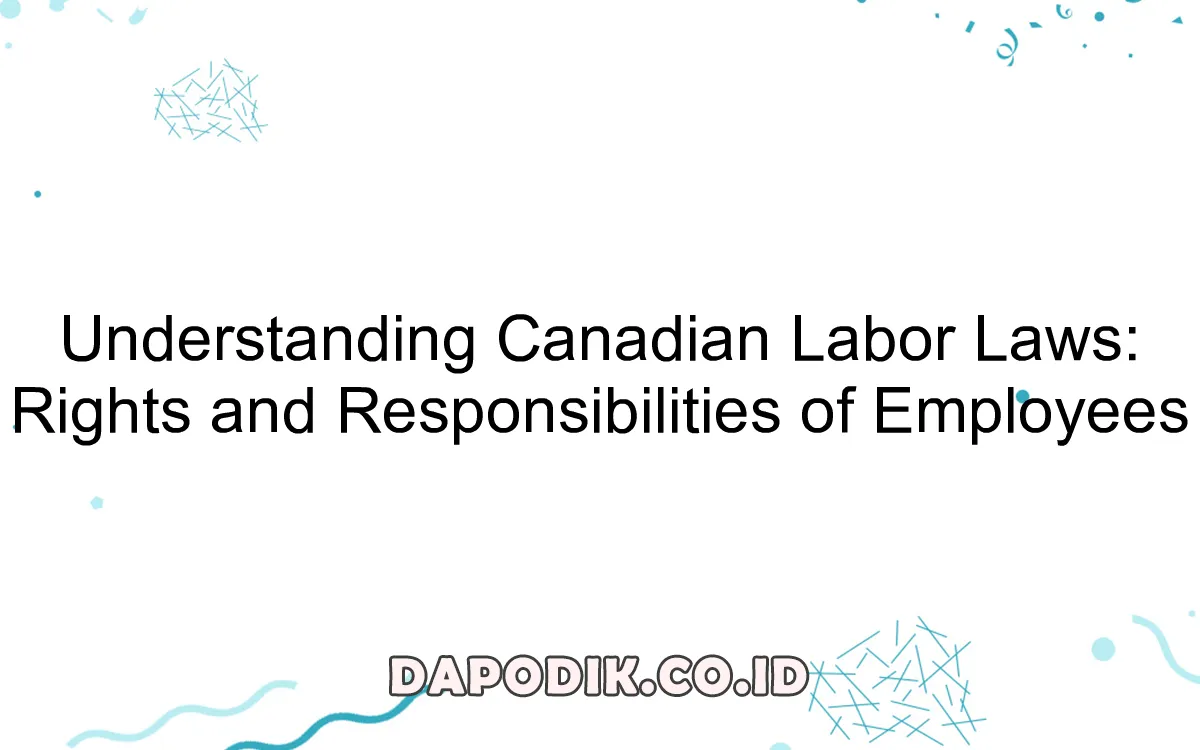Understanding Canadian Labor Laws: Rights and Responsibilities of Employees
Understanding Canadian Labor Laws: Rights and Responsibilities of Employees
Overview of Labor Laws in Canada
When it comes to working in Canada, it is important to have a good understanding of the labor laws that protect the rights and outline the responsibilities of employees. These laws play a significant role in ensuring fair treatment and maintaining a healthy work environment. This article will provide an overview of the key aspects of labor laws in Canada.
1. Employment Standards
Canadian labor laws, governed at both federal and provincial levels, establish minimum employment standards that employees must receive. These standards include regulations on minimum wage, working hours, vacation entitlement, and overtime compensation.
2. Human Rights
Human rights legislation in Canada prohibits discrimination in the workplace based on factors such as gender, race, religion, disability, and sexual orientation. Employers are required to provide an inclusive and diverse environment free from harassment and discrimination.
3. Health and Safety
The health and safety of employees are protected under various laws and regulations in Canada. Employers have a legal obligation to provide a safe workplace, assess and address hazards, and ensure proper training and equipment for employees.
4. Collective Bargaining
In Canada, employees have the right to join trade unions and engage in collective bargaining. Labor laws protect the rights of workers to negotiate working conditions, wages, and other terms of employment collectively.
5. Termination and Severance
Provisions related to termination and severance pay vary across different provinces and territories in Canada. However, labor laws generally require employers to provide reasonable notice or compensation in case of termination without just cause.
6. Employment Insurance
Canadian labor laws also include provisions for employment insurance, which provides temporary financial assistance to individuals who have lost their jobs. Employees contribute to this program through deductions from their wages.
Conclusion
Having a good understanding of labor laws in Canada is crucial for both employers and employees. These laws ensure fair treatment, protect employees’ rights, and promote a harmonious work environment. It is advisable to consult the specific labor laws in your province or territory for more detailed information.
Employee Rights and Protections in the Canadian Workplace

When it comes to understanding Canadian labor laws, it is essential for employees to be aware of their rights and responsibilities. These laws aim to ensure fair treatment and protect the rights of workers throughout the country. In this article, we will discuss some key rights and protections that employees have in the Canadian workplace.
1. Employment Standards
Under Canadian labor laws, employees are entitled to various employment standards, which include but are not limited to:
- Fair wages: Employees have the right to be paid fair wages for their work based on minimum wage standards set by the government.
- Hours of work: There are regulations regarding the maximum number of hours an employee can work in a day or week, as well as rules regarding break periods and overtime pay.
- Termination and severance: Employees have rights concerning notice period and severance pay if their employment is terminated, depending on the length of their employment.
2. Health and Safety
The health and safety of employees is a top priority in the Canadian workplace. Employers are required to provide a safe working environment, free from hazards that could cause harm to employees. Some of the key provisions include:
- Employers must conduct regular risk assessments and implement safety protocols to protect their employees.
- Employees have the right to refuse to perform work if they believe it poses an immediate danger to their health or safety.
- Workers who experience workplace injuries or illnesses are entitled to compensation and benefits.
3. Discrimination and Harassment
It is against Canadian labor laws to discriminate against employees based on factors such as race, gender, age, religion, disability, or sexual orientation. Similarly, harassment, whether sexual or non-sexual, is strictly prohibited. Some key protections in this area include:
- Employees can file complaints of discrimination or harassment to the appropriate regulatory bodies.
- Employers are required to provide a safe and inclusive work environment, taking action against any reported cases of discrimination or harassment.
- Employees who experience discrimination or harassment can seek compensation for damages caused.
4. Privacy Rights
Employees in Canada have certain privacy rights in the workplace:
- Employers must obtain consent from employees before collecting, using, or disclosing any personal information, except where required by law.
- Employees should have access to their personal information held by their employer, subject to some exceptions.
- Employers must protect employees’ personal information from unauthorized access or disclosure.
It is important for employees to have a clear understanding of their rights and protections under Canadian labor laws. By knowing these rights, employees can ensure fair treatment in the workplace and take appropriate action if they believe their rights are being violated.
Key Responsibilities of Employees under Canadian Labor Laws
When it comes to working in Canada, employees have specific rights and responsibilities under the Canadian labor laws. Understanding these key responsibilities is essential to ensure a harmonious relationship between the employer and the employee. Let’s take a closer look at some of the key responsibilities that employees should be aware of:
1. Work in a Safe and Healthy Environment
Employees have the right to work in a safe and healthy environment. It is their responsibility to follow all safety guidelines provided by their employer, use personal protective equipment when required, and report any hazardous conditions or workplace injuries promptly.
2. Comply with Employment Standards
Employees must adhere to the employment standards set by the government, including minimum wage, working hours, overtime pay, and vacation entitlements. It is crucial to be aware of the specific employment standards that apply to your province or territory.
3. Perform Duties with Diligence and Professionalism
Employees are responsible for performing their job duties with diligence, competence, and professionalism. This includes being punctual, meeting deadlines, following instructions, and maintaining a respectful attitude towards coworkers and supervisors.
4. Protect Confidential Information
Employees have a duty to protect any confidential information they come across during the course of their employment. This includes customer data, trade secrets, proprietary information, and any other sensitive information that should not be disclosed to unauthorized individuals.
5. Use Company Resources Responsibly
Employees should use company resources, such as equipment, software, and supplies, responsibly and solely for work-related purposes. Unauthorized use or misuse of company resources can result in disciplinary actions.
6. Report Workplace Harassment or Discrimination
If an employee experiences or witnesses any form of workplace harassment or discrimination, it is their duty to report it to their employer or designated authority. Employers have an obligation to address such concerns promptly and ensure a safe and inclusive work environment for all.
7. Continuous Professional Development
Employees are responsible for continuously improving their skills and knowledge related to their job. This may involve participating in training programs, attending seminars, or pursuing further education to enhance their expertise and contribute effectively to their organization.
By understanding and fulfilling these key responsibilities, employees can not only protect their rights but also contribute to a productive and respectful work environment. It is essential to stay informed about the labor laws specific to your region to ensure compliance and a positive work experience.
Conclusion
Understanding Canadian labor laws is crucial for employees to know their rights and responsibilities. These laws provide protection against discrimination, unfair treatment, and ensure fair compensation. It is essential for individuals to familiarize themselves with these laws to create a conducive working environment and uphold their rights.

Posting Komentar untuk "Understanding Canadian Labor Laws: Rights and Responsibilities of Employees"
Gambar ataupun video yang ada di situs ini terkadang berasal dari berbagai sumber media lain. Hak Cipta sepenuhnya dipegang oleh sumber tersebut.